牛津英语(试用本)小升初各类题型复习基础卷(含答案)
文档属性
| 名称 | 牛津英语(试用本)小升初各类题型复习基础卷(含答案) | 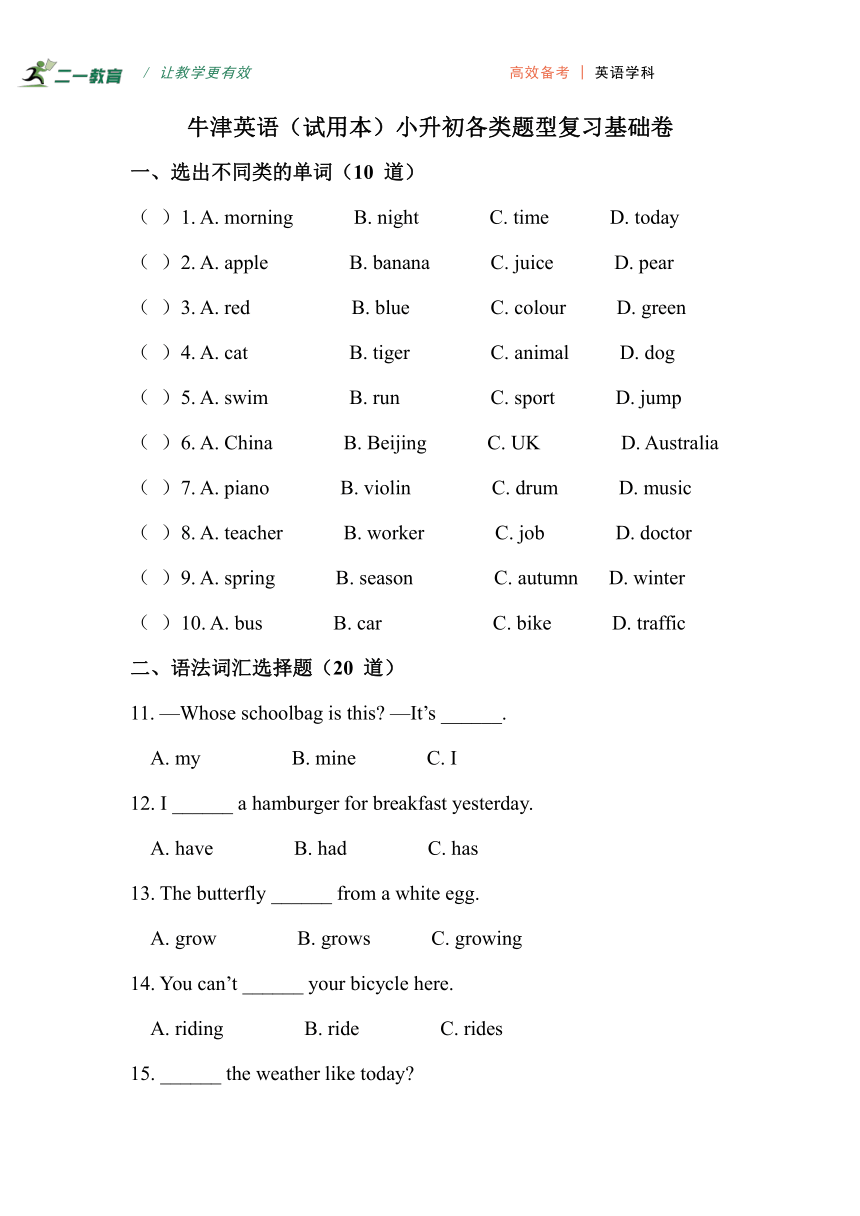 | |
| 格式 | docx | ||
| 文件大小 | 46.6KB | ||
| 资源类型 | 试卷 | ||
| 版本资源 | 牛津上海版(试用本) | ||
| 科目 | 英语 | ||
| 更新时间 | 2025-06-07 15:22:40 | ||
图片预览

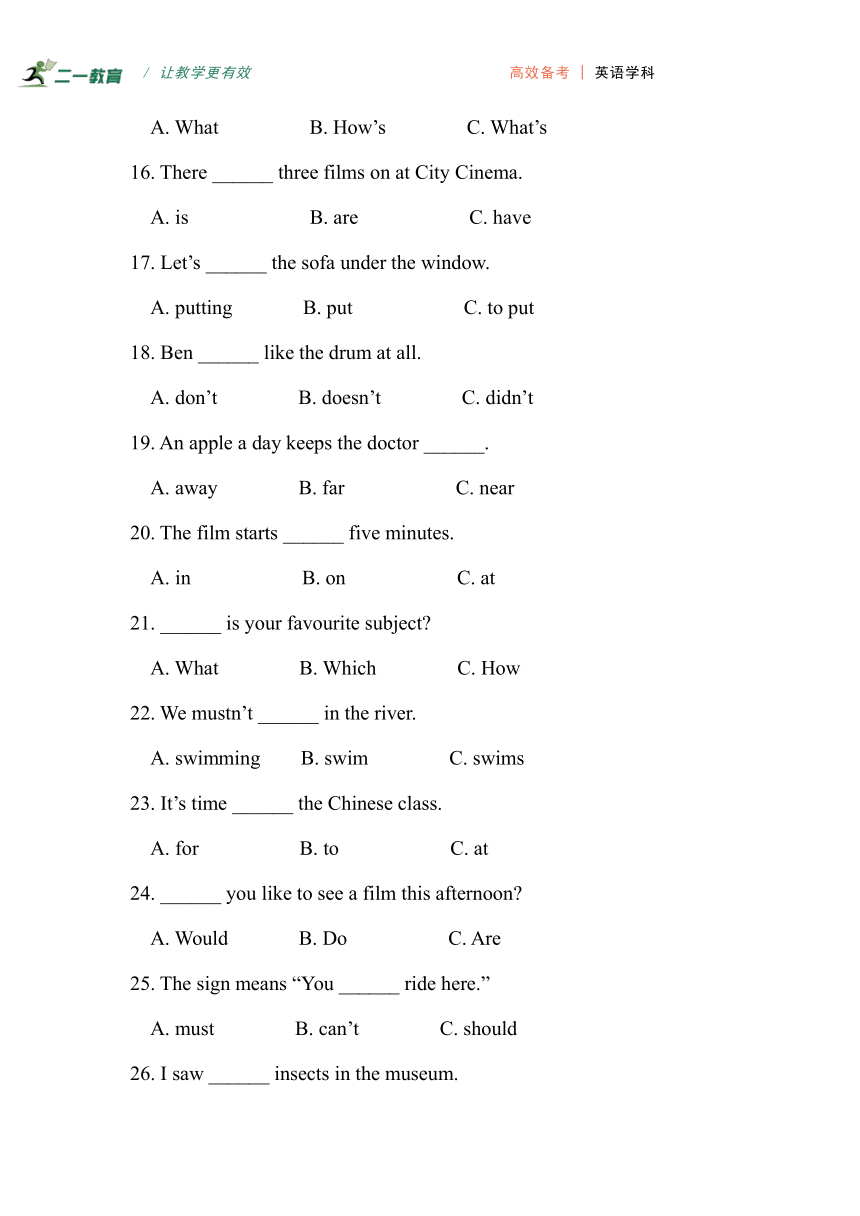
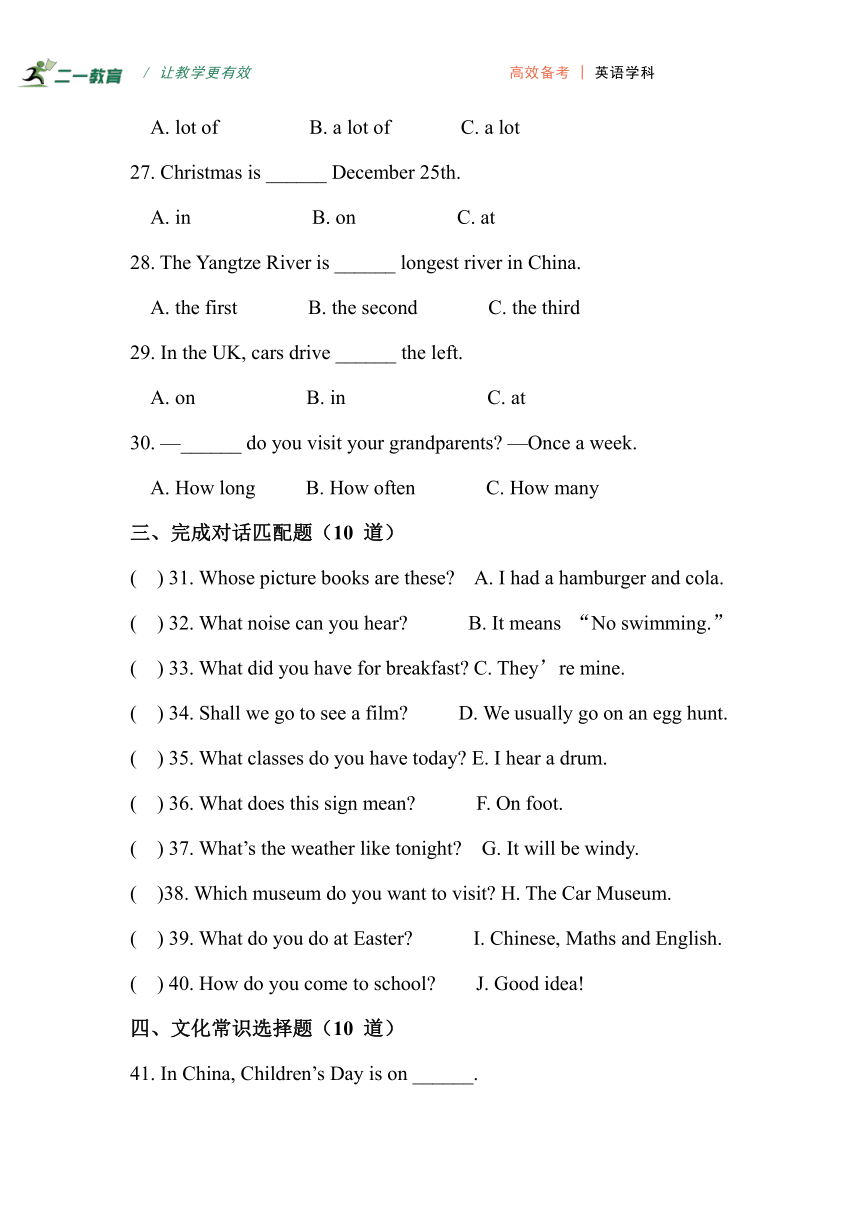
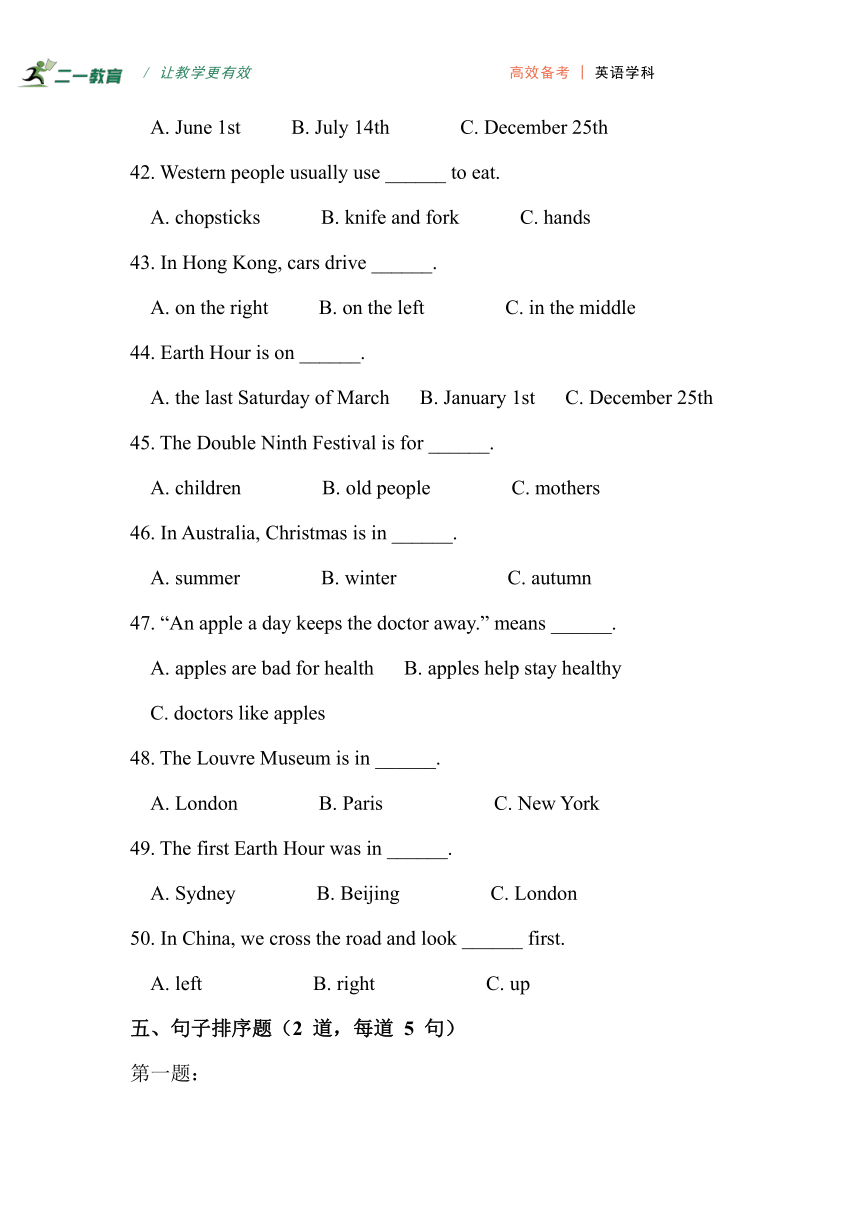
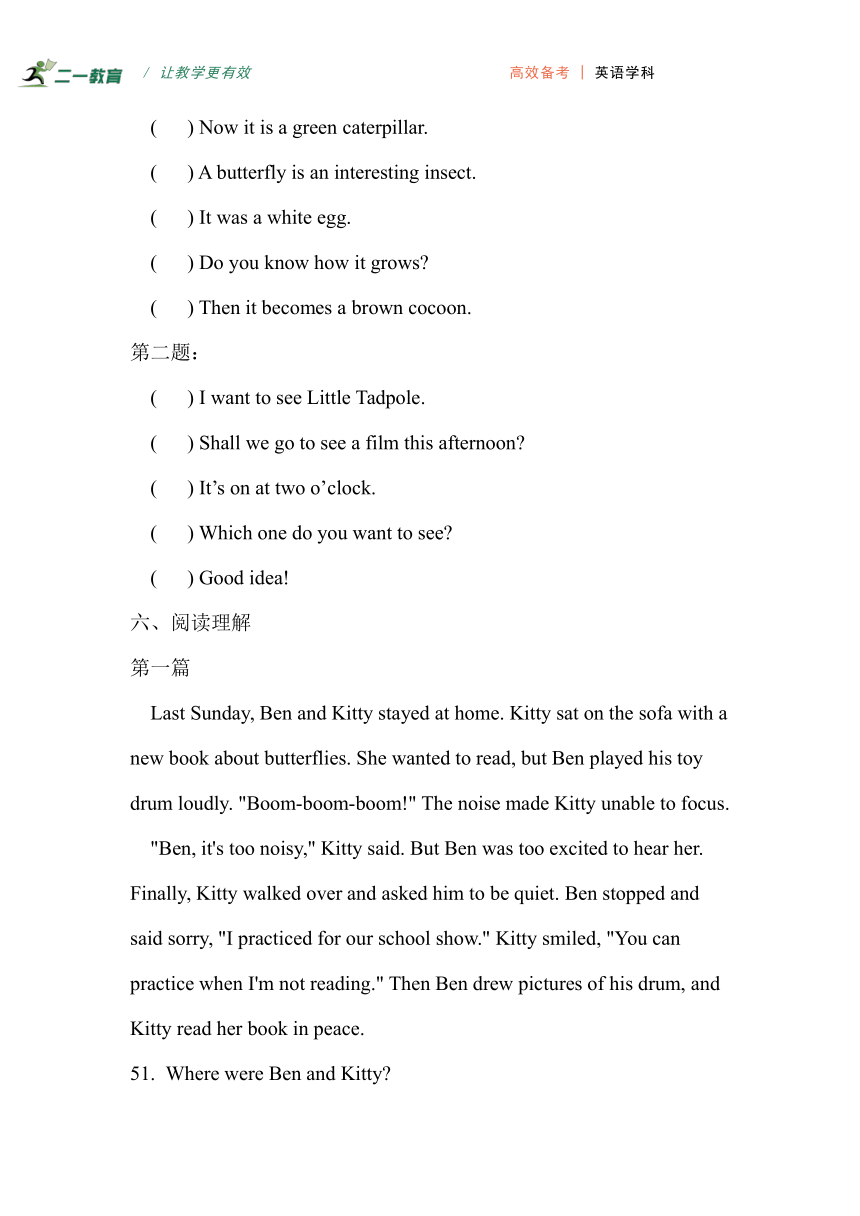
文档简介
/ 让教学更有效 高效备考 | 英语学科
牛津英语(试用本)小升初各类题型复习基础卷
一、选出不同类的单词(10 道)
( )1. A. morning B. night C. time D. today
( )2. A. apple B. banana C. juice D. pear
( )3. A. red B. blue C. colour D. green
( )4. A. cat B. tiger C. animal D. dog
( )5. A. swim B. run C. sport D. jump
( )6. A. China B. Beijing C. UK D. Australia
( )7. A. piano B. violin C. drum D. music
( )8. A. teacher B. worker C. job D. doctor
( )9. A. spring B. season C. autumn D. winter
( )10. A. bus B. car C. bike D. traffic
二、语法词汇选择题(20 道)
11. —Whose schoolbag is this —It’s ______.
A. my B. mine C. I
12. I ______ a hamburger for breakfast yesterday.
A. have B. had C. has
13. The butterfly ______ from a white egg.
A. grow B. grows C. growing
14. You can’t ______ your bicycle here.
A. riding B. ride C. rides
15. ______ the weather like today
A. What B. How’s C. What’s
16. There ______ three films on at City Cinema.
A. is B. are C. have
17. Let’s ______ the sofa under the window.
A. putting B. put C. to put
18. Ben ______ like the drum at all.
A. don’t B. doesn’t C. didn’t
19. An apple a day keeps the doctor ______.
A. away B. far C. near
20. The film starts ______ five minutes.
A. in B. on C. at
21. ______ is your favourite subject
A. What B. Which C. How
22. We mustn’t ______ in the river.
A. swimming B. swim C. swims
23. It’s time ______ the Chinese class.
A. for B. to C. at
24. ______ you like to see a film this afternoon
A. Would B. Do C. Are
25. The sign means “You ______ ride here.”
A. must B. can’t C. should
26. I saw ______ insects in the museum.
A. lot of B. a lot of C. a lot
27. Christmas is ______ December 25th.
A. in B. on C. at
28. The Yangtze River is ______ longest river in China.
A. the first B. the second C. the third
29. In the UK, cars drive ______ the left.
A. on B. in C. at
30. —______ do you visit your grandparents —Once a week.
A. How long B. How often C. How many
三、完成对话匹配题(10 道)
( ) 31. Whose picture books are these A. I had a hamburger and cola.
( ) 32. What noise can you hear B. It means “No swimming.”
( ) 33. What did you have for breakfast C. They’re mine.
( ) 34. Shall we go to see a film D. We usually go on an egg hunt.
( ) 35. What classes do you have today E. I hear a drum.
( ) 36. What does this sign mean F. On foot.
( ) 37. What’s the weather like tonight G. It will be windy.
( )38. Which museum do you want to visit H. The Car Museum.
( ) 39. What do you do at Easter I. Chinese, Maths and English.
( ) 40. How do you come to school J. Good idea!
四、文化常识选择题(10 道)
41. In China, Children’s Day is on ______.
A. June 1st B. July 14th C. December 25th
42. Western people usually use ______ to eat.
A. chopsticks B. knife and fork C. hands
43. In Hong Kong, cars drive ______.
A. on the right B. on the left C. in the middle
44. Earth Hour is on ______.
A. the last Saturday of March B. January 1st C. December 25th
45. The Double Ninth Festival is for ______.
A. children B. old people C. mothers
46. In Australia, Christmas is in ______.
A. summer B. winter C. autumn
47. “An apple a day keeps the doctor away.” means ______.
A. apples are bad for health B. apples help stay healthy
C. doctors like apples
48. The Louvre Museum is in ______.
A. London B. Paris C. New York
49. The first Earth Hour was in ______.
A. Sydney B. Beijing C. London
50. In China, we cross the road and look ______ first.
A. left B. right C. up
五、句子排序题(2 道,每道 5 句)
第一题:
( ) Now it is a green caterpillar.
( ) A butterfly is an interesting insect.
( ) It was a white egg.
( ) Do you know how it grows
( ) Then it becomes a brown cocoon.
第二题:
( ) I want to see Little Tadpole.
( ) Shall we go to see a film this afternoon
( ) It’s on at two o’clock.
( ) Which one do you want to see
( ) Good idea!
六、阅读理解
第一篇
Last Sunday, Ben and Kitty stayed at home. Kitty sat on the sofa with a new book about butterflies. She wanted to read, but Ben played his toy drum loudly. "Boom-boom-boom!" The noise made Kitty unable to focus.
"Ben, it's too noisy," Kitty said. But Ben was too excited to hear her. Finally, Kitty walked over and asked him to be quiet. Ben stopped and said sorry, "I practiced for our school show." Kitty smiled, "You can practice when I'm not reading." Then Ben drew pictures of his drum, and Kitty read her book in peace.
Where were Ben and Kitty
A. At school. B. At home. C. In the park.
52. What did Kitty want to do
A. Play the drum. B. Read a book. C. Watch TV.
53. How did Ben feel about the noise
A. He liked it. B. He didn’t like it. C. He thought it was fun.
54. What did Ben say to Kitty
A. “Play louder.” B. “Be quiet.” C. “Let’s play together.”
55. Did Kitty say sorry
A. Yes, she did. B. No, she didn’t. C. We don’t know.
第二篇(5 题)
The Spring Festival is China's biggest holiday. It comes in January or February. Before the festival, families hang red lanterns and write "Fu" on red paper for good luck. They clean their houses to sweep away bad luck.
On New Year’s Eve, families eat dumplings and fish together. Children wear red clothes and get red envelopes (红包) with money. At night, they watch fireworks. During the festival, people visit relatives and say “Happy New Year!”It’s a happy time for everyone!.
56.What do people do during the Spring Festival
A. Buy new clothes. B. Go swimming. C. Plant trees.
57. What do children get
A. Red envelopes. B. Gifts. C. Books.
58. Is the Spring Festival a happy festival
A. Yes, it is. B. No, it isn’t. C. Sometimes.
59. What food do people eat
A. Noodles. B. Dumplings. C. Hamburgers.
60. Which is NOT true
A. People visit relatives. B. It’s in December.
C. People wear new clothes.
第三题(5 题):
Have you noticed tree shadows change during the day In the morning, when the sun rises, shadows are long and thin. The sun is low, so shadows stretch far. At noon, the sun is high, and shadows become very short—just a small circle under the tree.
In the afternoon, as the sun goes down, shadows grow long again, but point the other way. This happens because the sun moves across the sky. Watching shadows is fun—try seeing how your own shadow changes!.
When is the shadow long
When is the shadow short
Does the shadow change every day
Why is the shadow long in the morning
Do you like watching shadows Why
七、首字母填空(10 空)
66. A b______ is an interesting insect.
67. We have C______, Maths and English in the morning.
68. The sign means we m______ swim here.
69. It will be w______ tonight.
70. Let’s give him a s______!
71. I saw a lot of i______ in the museum.
72. Christmas is a w______ holiday.
73. The Yangtze River is the f______ longest in Asia.
74. In the UK, Children’s Day is in J______.
75. Practice makes p______.
八、规范书写(写出字母的左邻右舍)
76. ______ Bb ______ 77. ______ Ee ______
78. ______ Gg ______ 79.______ Jj ______
80. ______ Mm ______
九、重组单词(10 道)
81. l p p a e → ______ 82. c a t → ______
83. r a i n → ______ 84. b u s → ______
85. d o g → ______ 86. s u n → ______
87. b i k e → ______ 88. t e a → ______
89. f l o w e r → ______ 90. s c h o o l → ______
十、连词成句(10 道)
91. is / whose / this / schoolbag ( )
put / on / her / it / desk (.)
have / what / breakfast / you / for did ( )
to / see / film / a / shall / we ( )
do / have / what / today / classes / you ( )
means / it / swim / mustn’t / we (.)
was / egg / it / white / a (.)
at / were / home / Ben / Kitty / and (.)
noise / hear / can / what / you ( )
favourite / is / food / that / my (.)
十一、书面表达
以 “My Day” 为题,写一篇不少于 8 句话的短文,描述你的一天活动。(参考句型:In the morning.../ In the afternoon.../ In the evening...)
基础卷答案及解析
一、选出不同类的单词
1. C(time 是时间总称,其他为具体时段)
2. (juice 是饮品,其他为水果)
3. C(colour 是颜色总称,其他为具体颜色)
4. C(animal 是动物总称,其他为具体动物)
5. C(sport 是运动总称,其他为具体动作)
6. B(Beijing 是城市,其他为国家)
7. D(music 是音乐总称,其他为乐器)
8. C(job 是职业总称,其他为具体职业)
9. B(season 是季节总称,其他为具体季节)
10. D(traffic 是交通总称,其他为交通工具)
二、语法词汇选择题
11. B(mine=my schoolbag,名词性物主代词)
12. B(yesterday 提示过去时,用 had)
13. B(主语 butterfly 是第三人称单数,用 grows)
14. B(can’t 后接动词原形 ride)
15. C(What’s the weather like 固定句型)
16. B(three films 是复数,用 are)
17. B(Let’s 后接动词原形 put)
18. B(Ben 是第三人称单数,否定用 doesn’t)
19. A(keep...away 固定搭配,意为 “使远离”)
20. A(in + 时间段表示 “在…… 之后”)
21. A(问 “最喜欢的科目是什么” 用 What)
22. B(mustn’t 后接动词原形 swim)
23. A(It’s time for + 名词,意为 “该做…… 了”)
24. A(Would you like to... 固定句型)
25. B(标志意为 “禁止骑行”,用 can’t)
26. B(a lot of + 名词,意为 “许多”)
27. B(具体日期前用介词 on)
28. A(长江是中国第一长河)
29. A(on the left 固定搭配,意为 “靠左”)
30. B(问频率用 How often,意为 “多久一次”)
三、完成对话匹配题
31.C 32. E 33. A 34. J 35. I
36. B 37. G 38. H 39. D 40. F
四、文化常识选择题
41. A(中国儿童节在 6 月 1 日)
42. B(西方人常用刀叉进食)
43. B(香港车辆靠左行驶)
44. A(地球一小时在 3 月最后一个周六)
45. B(重阳节是老人的节日)
46. A(澳大利亚圣诞节在夏季)
47. B(苹果有助于保持健康)
48. B(卢浮宫在巴黎)
49. A(首届地球一小时在悉尼)
50. A(中国过马路先看左)
五、句子排序题
第一题:3-5-1-2-4
第二题:3-1-5-2-4
六、阅读理解
51. B(Ben 和 Kitty 在家)
52. B(Kitty 想读书)
53. A(Ben 觉得打鼓有趣,喜欢噪音)
54. B(Ben 对 Kitty 说 “请安静”)
55. B(是 Ben 说抱歉,Kitty 没有)
第二篇(5 题)
A(春节人们买新衣)
A(孩子收红包)
A(春节是快乐的节日)
B(人们吃饺子)
B(春节不在 12 月)
第三篇,回答问题(5 题)
61. In the morning and afternoon.(早晨和下午影子长)
62. At noon.(中午影子短)
63. Yes, it does.(影子每天变化)
64. Because the sun is low in the sky.(因为太阳位置低)
65. Yes, because it's fun to see how shadows change.(示例答案,合理即可).
七、首字母填空
66. butterfly 67. Chinese 68 . mustn’t 69. windy 70. surprise
71. insects 72. western 73. first 74. July 75. perfect
八、规范书写
76. Aa-Cc 77. Dd-Ff 78. Ff-Hh 79. Ii-Kk 80. Ll-Nn
九、重组单词
81. apple 82. cat 83. rain 84. bus 85. dog
86. sun 87. bike 88. tea 89. flower 90. school
十、连词成句
91. Whose schoolbag is this
92. Put it on her desk.
93. What did you have for breakfast
94. Shall we go to see a film
95. What classes do you have today
96. It means we mustn’t swim.
97. It was a white egg.
98. Ben and Kitty were at home.
99. What noise can you hear
100. That is my favourite food.
十一题、书面表达参考范文
My Day
I have a happy day. In the morning, I get up at 7:00 and have bread and milk for breakfast. Then I go to school with my friend Lucy. We have Chinese and Maths in the morning. At noon, I eat lunch at school with my classmates.
In the afternoon, we have PE and Art. I like drawing pictures in Art class. After school, I play basketball with my brother in the park. It’s fun!
In the evening, I do my homework and watch TV with my family. I go to bed at 9:00. What a nice day!
解析:采用 “In the morning/afternoon/evening” 结构,符合题目要求的时间顺序
动词使用一般现在时,如 “get up, go to school”
句子简短(每段 3-4 句),使用基础词汇(bread, PE, basketball)
避免复杂语法,使用 “I like.../I can.../We...” 等基础句型
牛津英语(试用本)小升初各类题型复习基础卷
一、选出不同类的单词(10 道)
( )1. A. morning B. night C. time D. today
( )2. A. apple B. banana C. juice D. pear
( )3. A. red B. blue C. colour D. green
( )4. A. cat B. tiger C. animal D. dog
( )5. A. swim B. run C. sport D. jump
( )6. A. China B. Beijing C. UK D. Australia
( )7. A. piano B. violin C. drum D. music
( )8. A. teacher B. worker C. job D. doctor
( )9. A. spring B. season C. autumn D. winter
( )10. A. bus B. car C. bike D. traffic
二、语法词汇选择题(20 道)
11. —Whose schoolbag is this —It’s ______.
A. my B. mine C. I
12. I ______ a hamburger for breakfast yesterday.
A. have B. had C. has
13. The butterfly ______ from a white egg.
A. grow B. grows C. growing
14. You can’t ______ your bicycle here.
A. riding B. ride C. rides
15. ______ the weather like today
A. What B. How’s C. What’s
16. There ______ three films on at City Cinema.
A. is B. are C. have
17. Let’s ______ the sofa under the window.
A. putting B. put C. to put
18. Ben ______ like the drum at all.
A. don’t B. doesn’t C. didn’t
19. An apple a day keeps the doctor ______.
A. away B. far C. near
20. The film starts ______ five minutes.
A. in B. on C. at
21. ______ is your favourite subject
A. What B. Which C. How
22. We mustn’t ______ in the river.
A. swimming B. swim C. swims
23. It’s time ______ the Chinese class.
A. for B. to C. at
24. ______ you like to see a film this afternoon
A. Would B. Do C. Are
25. The sign means “You ______ ride here.”
A. must B. can’t C. should
26. I saw ______ insects in the museum.
A. lot of B. a lot of C. a lot
27. Christmas is ______ December 25th.
A. in B. on C. at
28. The Yangtze River is ______ longest river in China.
A. the first B. the second C. the third
29. In the UK, cars drive ______ the left.
A. on B. in C. at
30. —______ do you visit your grandparents —Once a week.
A. How long B. How often C. How many
三、完成对话匹配题(10 道)
( ) 31. Whose picture books are these A. I had a hamburger and cola.
( ) 32. What noise can you hear B. It means “No swimming.”
( ) 33. What did you have for breakfast C. They’re mine.
( ) 34. Shall we go to see a film D. We usually go on an egg hunt.
( ) 35. What classes do you have today E. I hear a drum.
( ) 36. What does this sign mean F. On foot.
( ) 37. What’s the weather like tonight G. It will be windy.
( )38. Which museum do you want to visit H. The Car Museum.
( ) 39. What do you do at Easter I. Chinese, Maths and English.
( ) 40. How do you come to school J. Good idea!
四、文化常识选择题(10 道)
41. In China, Children’s Day is on ______.
A. June 1st B. July 14th C. December 25th
42. Western people usually use ______ to eat.
A. chopsticks B. knife and fork C. hands
43. In Hong Kong, cars drive ______.
A. on the right B. on the left C. in the middle
44. Earth Hour is on ______.
A. the last Saturday of March B. January 1st C. December 25th
45. The Double Ninth Festival is for ______.
A. children B. old people C. mothers
46. In Australia, Christmas is in ______.
A. summer B. winter C. autumn
47. “An apple a day keeps the doctor away.” means ______.
A. apples are bad for health B. apples help stay healthy
C. doctors like apples
48. The Louvre Museum is in ______.
A. London B. Paris C. New York
49. The first Earth Hour was in ______.
A. Sydney B. Beijing C. London
50. In China, we cross the road and look ______ first.
A. left B. right C. up
五、句子排序题(2 道,每道 5 句)
第一题:
( ) Now it is a green caterpillar.
( ) A butterfly is an interesting insect.
( ) It was a white egg.
( ) Do you know how it grows
( ) Then it becomes a brown cocoon.
第二题:
( ) I want to see Little Tadpole.
( ) Shall we go to see a film this afternoon
( ) It’s on at two o’clock.
( ) Which one do you want to see
( ) Good idea!
六、阅读理解
第一篇
Last Sunday, Ben and Kitty stayed at home. Kitty sat on the sofa with a new book about butterflies. She wanted to read, but Ben played his toy drum loudly. "Boom-boom-boom!" The noise made Kitty unable to focus.
"Ben, it's too noisy," Kitty said. But Ben was too excited to hear her. Finally, Kitty walked over and asked him to be quiet. Ben stopped and said sorry, "I practiced for our school show." Kitty smiled, "You can practice when I'm not reading." Then Ben drew pictures of his drum, and Kitty read her book in peace.
Where were Ben and Kitty
A. At school. B. At home. C. In the park.
52. What did Kitty want to do
A. Play the drum. B. Read a book. C. Watch TV.
53. How did Ben feel about the noise
A. He liked it. B. He didn’t like it. C. He thought it was fun.
54. What did Ben say to Kitty
A. “Play louder.” B. “Be quiet.” C. “Let’s play together.”
55. Did Kitty say sorry
A. Yes, she did. B. No, she didn’t. C. We don’t know.
第二篇(5 题)
The Spring Festival is China's biggest holiday. It comes in January or February. Before the festival, families hang red lanterns and write "Fu" on red paper for good luck. They clean their houses to sweep away bad luck.
On New Year’s Eve, families eat dumplings and fish together. Children wear red clothes and get red envelopes (红包) with money. At night, they watch fireworks. During the festival, people visit relatives and say “Happy New Year!”It’s a happy time for everyone!.
56.What do people do during the Spring Festival
A. Buy new clothes. B. Go swimming. C. Plant trees.
57. What do children get
A. Red envelopes. B. Gifts. C. Books.
58. Is the Spring Festival a happy festival
A. Yes, it is. B. No, it isn’t. C. Sometimes.
59. What food do people eat
A. Noodles. B. Dumplings. C. Hamburgers.
60. Which is NOT true
A. People visit relatives. B. It’s in December.
C. People wear new clothes.
第三题(5 题):
Have you noticed tree shadows change during the day In the morning, when the sun rises, shadows are long and thin. The sun is low, so shadows stretch far. At noon, the sun is high, and shadows become very short—just a small circle under the tree.
In the afternoon, as the sun goes down, shadows grow long again, but point the other way. This happens because the sun moves across the sky. Watching shadows is fun—try seeing how your own shadow changes!.
When is the shadow long
When is the shadow short
Does the shadow change every day
Why is the shadow long in the morning
Do you like watching shadows Why
七、首字母填空(10 空)
66. A b______ is an interesting insect.
67. We have C______, Maths and English in the morning.
68. The sign means we m______ swim here.
69. It will be w______ tonight.
70. Let’s give him a s______!
71. I saw a lot of i______ in the museum.
72. Christmas is a w______ holiday.
73. The Yangtze River is the f______ longest in Asia.
74. In the UK, Children’s Day is in J______.
75. Practice makes p______.
八、规范书写(写出字母的左邻右舍)
76. ______ Bb ______ 77. ______ Ee ______
78. ______ Gg ______ 79.______ Jj ______
80. ______ Mm ______
九、重组单词(10 道)
81. l p p a e → ______ 82. c a t → ______
83. r a i n → ______ 84. b u s → ______
85. d o g → ______ 86. s u n → ______
87. b i k e → ______ 88. t e a → ______
89. f l o w e r → ______ 90. s c h o o l → ______
十、连词成句(10 道)
91. is / whose / this / schoolbag ( )
put / on / her / it / desk (.)
have / what / breakfast / you / for did ( )
to / see / film / a / shall / we ( )
do / have / what / today / classes / you ( )
means / it / swim / mustn’t / we (.)
was / egg / it / white / a (.)
at / were / home / Ben / Kitty / and (.)
noise / hear / can / what / you ( )
favourite / is / food / that / my (.)
十一、书面表达
以 “My Day” 为题,写一篇不少于 8 句话的短文,描述你的一天活动。(参考句型:In the morning.../ In the afternoon.../ In the evening...)
基础卷答案及解析
一、选出不同类的单词
1. C(time 是时间总称,其他为具体时段)
2. (juice 是饮品,其他为水果)
3. C(colour 是颜色总称,其他为具体颜色)
4. C(animal 是动物总称,其他为具体动物)
5. C(sport 是运动总称,其他为具体动作)
6. B(Beijing 是城市,其他为国家)
7. D(music 是音乐总称,其他为乐器)
8. C(job 是职业总称,其他为具体职业)
9. B(season 是季节总称,其他为具体季节)
10. D(traffic 是交通总称,其他为交通工具)
二、语法词汇选择题
11. B(mine=my schoolbag,名词性物主代词)
12. B(yesterday 提示过去时,用 had)
13. B(主语 butterfly 是第三人称单数,用 grows)
14. B(can’t 后接动词原形 ride)
15. C(What’s the weather like 固定句型)
16. B(three films 是复数,用 are)
17. B(Let’s 后接动词原形 put)
18. B(Ben 是第三人称单数,否定用 doesn’t)
19. A(keep...away 固定搭配,意为 “使远离”)
20. A(in + 时间段表示 “在…… 之后”)
21. A(问 “最喜欢的科目是什么” 用 What)
22. B(mustn’t 后接动词原形 swim)
23. A(It’s time for + 名词,意为 “该做…… 了”)
24. A(Would you like to... 固定句型)
25. B(标志意为 “禁止骑行”,用 can’t)
26. B(a lot of + 名词,意为 “许多”)
27. B(具体日期前用介词 on)
28. A(长江是中国第一长河)
29. A(on the left 固定搭配,意为 “靠左”)
30. B(问频率用 How often,意为 “多久一次”)
三、完成对话匹配题
31.C 32. E 33. A 34. J 35. I
36. B 37. G 38. H 39. D 40. F
四、文化常识选择题
41. A(中国儿童节在 6 月 1 日)
42. B(西方人常用刀叉进食)
43. B(香港车辆靠左行驶)
44. A(地球一小时在 3 月最后一个周六)
45. B(重阳节是老人的节日)
46. A(澳大利亚圣诞节在夏季)
47. B(苹果有助于保持健康)
48. B(卢浮宫在巴黎)
49. A(首届地球一小时在悉尼)
50. A(中国过马路先看左)
五、句子排序题
第一题:3-5-1-2-4
第二题:3-1-5-2-4
六、阅读理解
51. B(Ben 和 Kitty 在家)
52. B(Kitty 想读书)
53. A(Ben 觉得打鼓有趣,喜欢噪音)
54. B(Ben 对 Kitty 说 “请安静”)
55. B(是 Ben 说抱歉,Kitty 没有)
第二篇(5 题)
A(春节人们买新衣)
A(孩子收红包)
A(春节是快乐的节日)
B(人们吃饺子)
B(春节不在 12 月)
第三篇,回答问题(5 题)
61. In the morning and afternoon.(早晨和下午影子长)
62. At noon.(中午影子短)
63. Yes, it does.(影子每天变化)
64. Because the sun is low in the sky.(因为太阳位置低)
65. Yes, because it's fun to see how shadows change.(示例答案,合理即可).
七、首字母填空
66. butterfly 67. Chinese 68 . mustn’t 69. windy 70. surprise
71. insects 72. western 73. first 74. July 75. perfect
八、规范书写
76. Aa-Cc 77. Dd-Ff 78. Ff-Hh 79. Ii-Kk 80. Ll-Nn
九、重组单词
81. apple 82. cat 83. rain 84. bus 85. dog
86. sun 87. bike 88. tea 89. flower 90. school
十、连词成句
91. Whose schoolbag is this
92. Put it on her desk.
93. What did you have for breakfast
94. Shall we go to see a film
95. What classes do you have today
96. It means we mustn’t swim.
97. It was a white egg.
98. Ben and Kitty were at home.
99. What noise can you hear
100. That is my favourite food.
十一题、书面表达参考范文
My Day
I have a happy day. In the morning, I get up at 7:00 and have bread and milk for breakfast. Then I go to school with my friend Lucy. We have Chinese and Maths in the morning. At noon, I eat lunch at school with my classmates.
In the afternoon, we have PE and Art. I like drawing pictures in Art class. After school, I play basketball with my brother in the park. It’s fun!
In the evening, I do my homework and watch TV with my family. I go to bed at 9:00. What a nice day!
解析:采用 “In the morning/afternoon/evening” 结构,符合题目要求的时间顺序
动词使用一般现在时,如 “get up, go to school”
句子简短(每段 3-4 句),使用基础词汇(bread, PE, basketball)
避免复杂语法,使用 “I like.../I can.../We...” 等基础句型
同课章节目录
